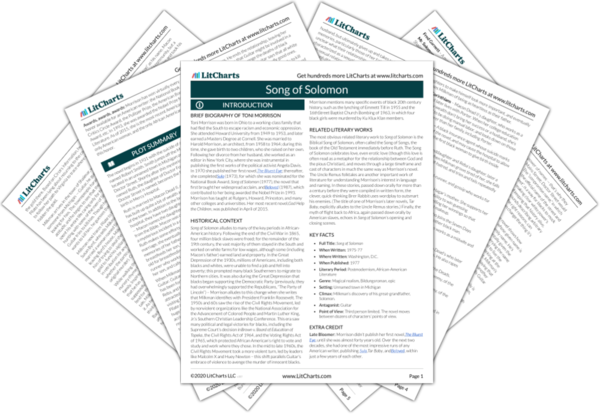The Power of Names
From the first page of Song of Solomon, it’s clear that names have enormous power. Names tell stories, record history, and build community. The name Doctor Street, for instance, celebrates Dr. Foster, the first wealthy, influential Black man to live in the town. By repeating this name, the townspeople honor their hero and celebrate their race and their culture. Government officials are completely aware of the power of names — that’s why they insist…
read analysis of The Power of NamesRacism
Song of Solomon, set between the 1930s and the 1960s, alludes to many milestones for Black culture in the 20th century: the rise of the New Deal Coalition, the Civil Rights Movement, the Black Power Movement, etc. It’s no coincidence that many of these milestones are related to race and Black people's battle with racism — Morrison’s novel is concerned with the many different forms that racism can take.
To begin with, it’s important…
read analysis of RacismMemory and Storytelling
All the characters in Song of Solomon are obsessed with and in many ways controlled by their memories of the past. The structure of the novel makes this very clear: Morrison often begins in medias res (in the middle of the action), and then loops back to describe how the characters got to this point.
In the first chapter, we see Macon walking through his town, unable to stop thinking about his painful experiences with…
read analysis of Memory and Storytelling
Masculinity and Femininity
As important as the relations between Black people and white people is to Song of Solomon, Morrison is equally interested in dramatizing the relationship between men and women.
In spite of (or even because of) the racism they endure from white culture, many Black men in the story are abusive and cruel to Black women. Guitar, for instance, regards women as inferior beings to men, even muttering to himself that Hagar is worthless…
read analysis of Masculinity and FemininityMercy and Forgiveness
As Morrison has written in her introduction to Song of Solomon, the novel moves from a state of no mercy to mercy. In the early chapters, we’re confronted with a cold, cruel world where even the hospital nurses aren’t very sympathetic when a man jumps off the roof. Macon is ruthless in collecting rent from his tenants, and Feather is equally stubborn in refusing to allow Milkman the child into his pool hall…
read analysis of Mercy and Forgiveness






